Johnny Cash was one of the most imposing and influential figures in post-World War II country music. With his deep, resonant baritone voice and unique guitar playing, Johnny Cash had his own distinctive style.
Cash was like no other artist in the country world. He created his own genre, halfway between the emotional nature of music, the rebelliousness of rock and roll, and country fatigue.
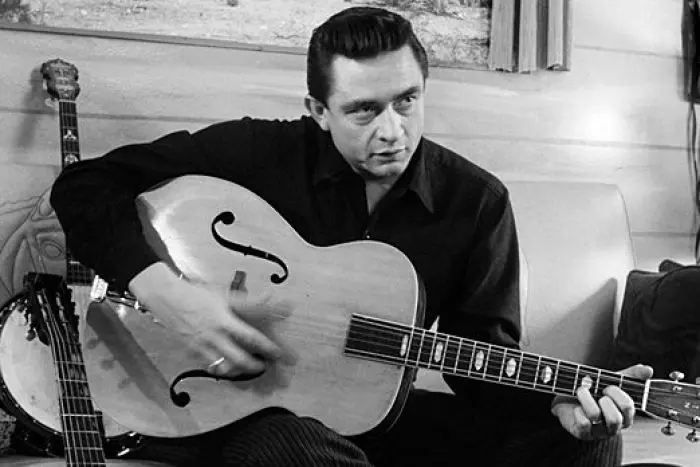
Cash's career coincided with the birth of rock and roll, and his singing and playing style had a lot in common with rock music. However, the musician is also heavy on the historical component in music - as he would later illustrate with his series of historical albums - this forever connected him with his country.
Johnny Cash was also one of the biggest country music stars of the 50s and 60s with over 100 hit singles.
Life before starting a musical career
Johnny Cash, whose birth name is J.R. Cash, was born and raised in Arkansas and moved to Dyes when he was three years old.
By the time he was 12 years old, he began to write his own songs. He was inspired by country songs he heard on the radio. When Cash was in high school, he sang on the Arkansas radio station KLCN.
Johnny Cash graduated from high school in 1950, moving to Detroit to work briefly in an automobile factory. With the outbreak of the Korean War, he enlisted in the US Air Force.
While in the Air Force, Cash bought his first guitar and taught himself to play. He began writing songs in earnest, including "Folsom Prison Blues". Cash left the Air Force in 1954, married a Texas woman named Vivian Leberto, and moved to Memphis where he took a course in radio broadcasting at the G.I. Bill Broadcasting School.
In the evenings, he played country music in a trio that also consisted of guitarist Luther Perkins and bassist Marshall Grant. The trio occasionally played for free on local radio station KWEM and attempted to secure gigs and auditions at Sun Records.
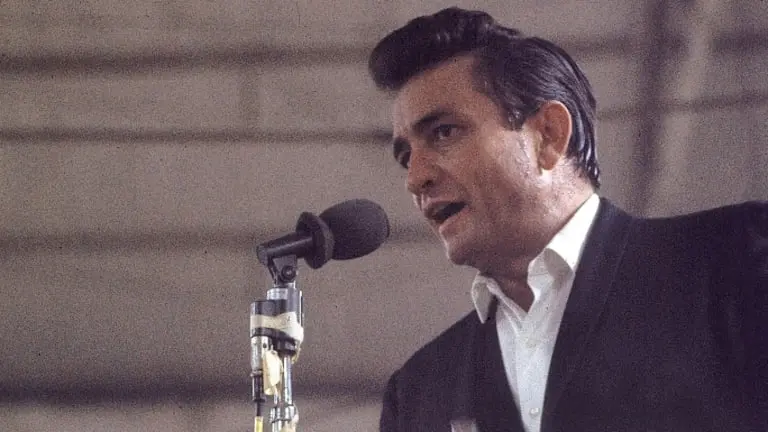
Johnny Cash's road to success
The young man finally got an audition with Sun Records in 1955. Cash soon released "Cry Cry Cry" / "Hey Porter" as his debut single for Sun. Phillips, the founder of the label named the singer by the name Johnny, which upset the guy because he thought that such a name sounded too young.
The single "Cry Cry Cry" became a success upon its release in 1955, it entered the national charts at number 14. The second single "Folsom Prison Blues" hit the top five in the country in early 1956, and its follow-up "I Walk the Line ” ranked number one for six weeks and made it into the top 20 pop music tracks.
Cash was an equally successful performer in 1957, with several hits in the country, including the Top 15 single "Give My Love to Rose".
Cash also debuted at the Grand Ole Opry that same year, wearing black while the other performers wore bright, rhinestone-embellished outfits. In the end, he received the nickname "The Man in Black" (The Man in Black).
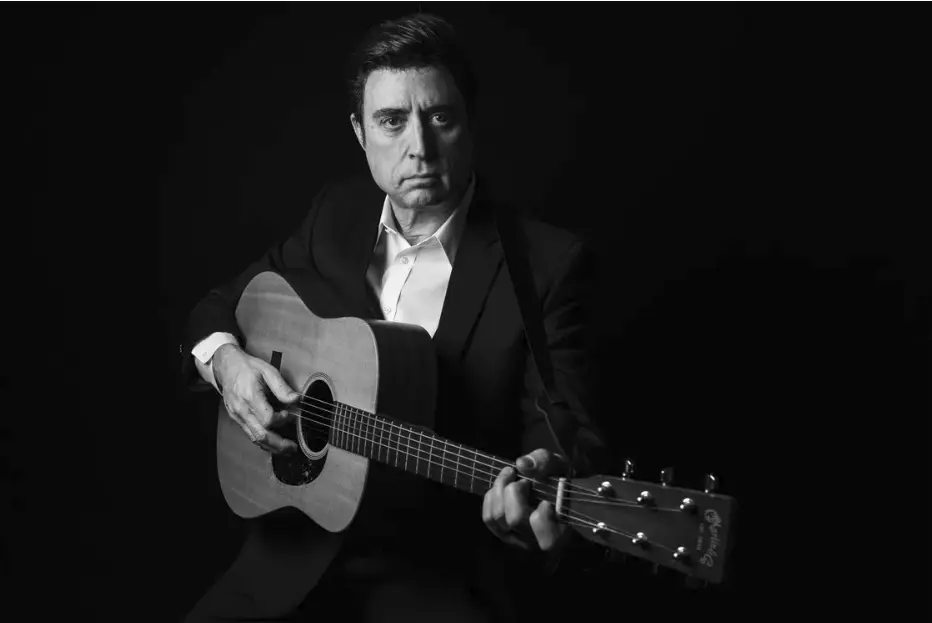
Cash became the first artist on the Sun label to release a "long-playing" album in November 1957. Then Johnny Cash with his Hot and Blue Guitar entered all music stores.
Cash's success continued to ride well into 1958 when Cash recorded his biggest hit, "Ballad of a Teenage Queen" (number one on the charts for ten weeks), as well as another hit single, "Guess Things Happen That Way". For most of 1958, Cash tried to record a gospel album, but Sun Records refused to let him record it.
Sun was also unwilling to increase Cash's royalties. Both of these factors were decisive in the idea of the vocalist to leave the label and sign with Columbia Records in 1958.
By the end of the year, he released his first single for the label, "All Over Again", which became another Top Five hit. Sun continued to release singles and albums of Cash's unreleased material into the 60s.
Inter-label rivalry for Johnny Cash
"Don't Take Your Guns to Town", Johnny Cash's second single for Columbia, was one of his biggest hits, reaching the top of the country charts. During this year, Sun Records and Columbia Records vied for the top of the charts, releasing singles from the musician. As a general rule, Columbia releases - "Frankie's Man Johnny", "I Got Stripes" and "Five Feet High and Rising" - performed better than the Sun singles, but "Luther Played the Boogie" did make the top ten.
That same year, Cash had the opportunity to make his gospel record, Hymns by Johnny Cash.
The Tennessee Two became the Tennessee Three in 1960 with the addition of drummer WS Holland.
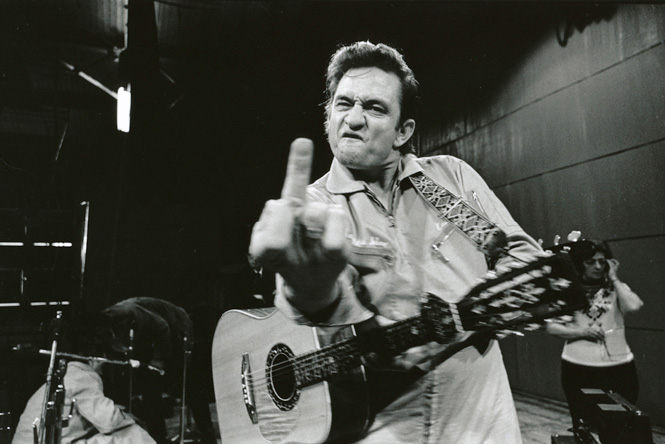
Problems in life - a crisis in creativity
Although Cash continued to produce hits, the relentless pace of his career was beginning to take its toll on his money. In 1959, the musician began taking amphetamines to help him cope with a schedule of almost 300 concerts a year.
By 1961, his drug use had skyrocketed, causing his work to suffer. This was strongly reflected in the declining number of singles and albums. By 1963, the singer had moved to New York, leaving his family behind.
June Carter, who was the wife of one of Cash's drinking buddies, Carl Smith, will ensure he returns to the top of the charts with "Ring of Fire". She co-wrote it with Merle Kilgore.
The single "Ring of Fire" spent seven weeks at the top of the charts and reached the top 20 hits. Cash continued his success in 1964 when "Understand Your Man" became a number one hit.
However, Cash's return was short-lived as he sank into his drug addiction and his hit singles appeared only sporadically.
Cash was arrested in El Paso for attempting to smuggle amphetamine into the country in his guitar case in 1965.
In the same year, the Grand Ole Opry withdrew from the performance of the musician.
In 1966, Cash's wife, Vivian, filed for divorce. After the divorce, Cash moved to Nashville. At first he led the same way of life, but soon Johnny became friends with June Carter, who divorced Carl Smith.
With Carter's help, he was able to kick his addictions; he also converted to Christianity. His career began to bounce back when "Jackson" and "Rosanna's Going Wild" hit the top ten.
In early 1968, during a concert, Cash proposed marriage to Carter; the couple married that spring.
New Johnny records
Also in 1968, Cash recorded and released his most popular album, Johnny Cash at Folsom Prison. By the end of the year, the record went gold.
The following year, the musician released a sequel, Johnny Cash at San Quentin, which featured his only Top 10 pop single, "A Boy Named Sue". It reached number three on the chart.
Johnny Cash appeared on Bob Dylan's 1969 country rock album Nashville Skyline as a guest musician. Dylan returned the favor to a colleague by appearing on the first episode of The Johnny Cash Show, the singer's television program for ABC. The Johnny Cash Show ran for two years, from 1969 to 1971.
Cash reached its second peak in popularity in 1970. In addition to his television show, he has performed for President Richard Nixon at the White House, played with Kirk Douglas in Gunfight, sang with John Williams and the Boston Pop Band, and has been featured in a documentary.
His album sales were equally good, as "Sunday Morning Coming Down" and "Flesh and Blood" were number one hits.
Throughout 1971, Cash still had some hits in his arsenal, including the most popular composition "Man in Black".
Cash and Carter became more socially active in the early 70s, campaigning for the civil rights of Native Americans and prisoners, and often working with Billy Graham.
In the mid-70s, Cash's presence on the country charts began to wane, but he continued to score occasional hits such as 1976's "One Piece in Time", "There Ain't No Good Chain Gang" and "(Ghost) Riders in the Sky."
Man in Black, Johnny Cash's autobiography, was published in 1975.
In 1980, he became the youngest performer to be inducted into the Country Music Hall of Fame. However, the 80s were a challenging time for Cash as his record sales continued to decline and he ran into problems with Columbia.
Cash, Carl Perkins and Jerry Lee Lewis teamed up to make The Revenant in 1982. The film had little success.
The Highwaymen - a band featuring Johnny Cash, Waylon Jennings, Willie Nelson and Kris Kristofferson - released their first album in 1985, which was also quite successful. The following year, Cash and Columbia Records ended their relationship, and the musician signed with Mercury Nashville.
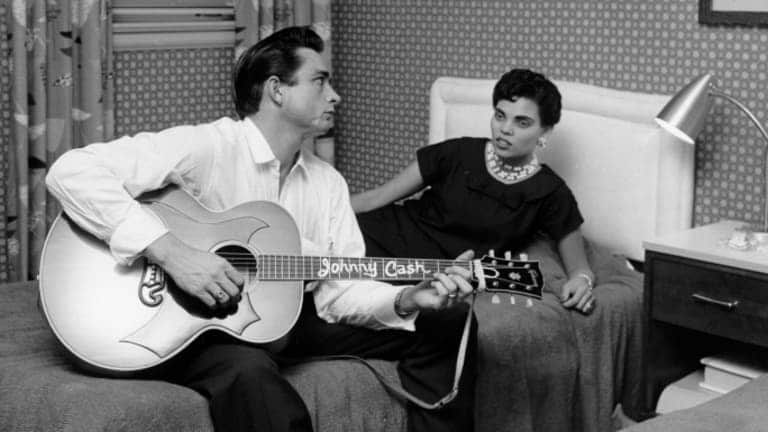
Work with the new label failed, as the company and the singer each fought for their own style.
In addition, country radio began to favor more contemporary artists, and Cash soon found himself off the charts. Nevertheless, he continued to be a popular concert performer.
The Highwaymen recorded a second album in 1992 and it was more commercially successful than any of Cash's Mercury albums. Around the same time, his contract with Mercury ended.
In 1993, the singer signed a contract with American Records. His first album for the label, American Recordings, was released by label founder Rick Rubin himself and was an amazing acoustic collection of songs.
The album, while not a best-selling success, did a good job resurrecting Cash's career and bringing him into contact with a younger, rock-oriented audience.
In 1995, The Highwaymen released their third album, The Road Goes on Forever.
The following year, Cash released his second album for American Records, Unchained, which received support from Tom Petty and The Heartbreakers.
In the spring of 2000, Cash prepared the three-disc compilation "Love, God, Murder" dedicated to the main song themes that dominated throughout his career. A new studio album, American III: Solitary Man, appeared later that year.
The end of Johnny Cash's career
Health problems plagued Cash throughout the 90s and 2000s, but he continued to record in the studio.
In 2003, Mark Romanek's music video for a Nine Inch Nails cover of "Hurt" received significant acclaim and media attention, culminating in a surprise nomination for Video of the Year at the MTV Video Music Awards.
Shortly after the video generated positive reviews, Johnny Cash's beloved wife, June Carter Cash, died of complications from heart surgery.
Four months later, in Nashville, Tennessee, Johnny also died of complications from diabetes.
He was 71 years old. Five months later, the "Legend of Johnny Cash" compilation hit the top ten. In 2006, Lost Highway released another series of Cash's legendary "American" recordings, American V: A Hundred Highways, from the late singer's last sessions with collaborator Rick Rubin.
The last release of these sessions appeared in early 2010 under the title American VI: Ain't No Grave and is reportedly the last release from American Recordings.
Sony Legacy in 2011 launched a series of rare, unreleased or hard-to-find Cash tracks from the two-disc albums Bootleg, Vol. 1: Personal File.
In the spring of 2014, Out Out of the Stars appeared - a collection of unreleased material recorded in the early 80s.



